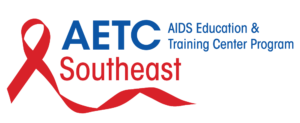Provider Resources
It is now recognized that outreach, testing, and linkage to care; case management; behavioral and oral health services; and patient advocacy are as essential to providing high quality HIV care as antiretroviral management, health maintenance, and laboratory monitoring. Please use these resources to improve your patient’s progress along the HIV Care Continuum.
- Case Conference Materials
- COVID-19 Updates for HIV Providers
- Cultural Humility & Reducing Stigma and Discrimination Provider Handbook
- Helpful Links
- Hepatitis C (HCV) Toolkit/Viral Hepatitis Project
- HIV and Corrections Toolkit: Transitional Care Coordination Model
- No Progress Without Us: A Toolkit for Integrating Sexual Health Practices Into College Health Settings
- Oral Health & Resources Training Center
- Quick Reference Materials/Pocket Cards
- Telehealth Resource Center
- Treatment Guidelines
Vanderbilt’s HIV Clinical Case Conference convenes each week at the VUMC Comprehensive Care Clinic and is offered virtually across the Southeast region. It utilizes an interdisciplinary team approach to choosing the best ART regimen and identifying needed wraparound services for each patient.
HIV providers are especially concerned about how COVID-19 may impact the health of their patients. The Southeast AETC is committed to bringing the latest research and information about HIV and COVID-19 to providers across the region.
This document serves as an informal education tool meant to address gaps in knowledge, demonstrate the necessity of drawing on key concepts and guidelines to improve patient outcomes, and identify resources for further learning and dialogue.
Information is empowering for those infected with and affected by HIV disease. Please visit our listings of links that may be useful for you.
This resource aims to improve providers’ capacity to screen, medically manage, and provide advanced care for patients with Hepatitis C virus. Resources for both patients and providers are also included on this page.
With support from HRSA’s Special Projects of National Significance (SPNS) program and the Centers for Disease Control and Prevention, UNC faculty have led innovative projects to help smooth the process of linkage to community-based care for persons with HIV leaving the state’s jails and prisons.
The key message from these studies is that care coordination – involving community-based professionals before release from jail or prison – is critically important. This toolkit builds upon a highly successful SPNS project conducted in Wake County, NC, Camden, NJ, and Las Vegas, NV to apply lessons learned from prison HIV care coordination to local jails. The team at the North Carolina AETC carefully evaluated the resources from the SPNS project, engaged local experts to provide feedback and context, and created a “wrap-around” set of resources that complements and enhances the work that our colleagues put in creating the Transitional Care Coordination (TCC) model.
As college health clinicians and providers, it is essential that we recognize the important roles we play in helping our students navigate their sexual health journeys. As patients seeking healthcare, they come to our health centers confused, uncertain, and carrying baggage from exhaustive google searches, YouTube videos and stigmatizing lived experiences. As such, we are presented with the opportunity to create safe, comfortable and nonjudgmental spaces in which students can confidently discuss their sexual concerns and issues without fear of judgment or discrimination.
This guide is meant to serve as a template by which college health clinicians and providers can approach the sexual health considerations and concerns of our student patients.
Oral Health providers, Primary Care providers, and other health professionals, especially in rural communities affected by HIV, often lack the resources to close the gap between overall health and oral health. The Southeast AETC Oral Health Training Center is offering innovative training and resources to close this gap and improve health outcomes and quality of life for our patients.
Quick Reference Pocket Cards are provided by our partners for your convenience. While we try to keep them updated and current, changes may occur in the meantime.
COVID-19 exacerbated the need for telehealth services across the nation, but telehealth will continue to grow beyond the context of the pandemic. Telehealth is particularly crucial in rural areas that lack sufficient health care services, specialists, and resources. This page features resources to help healthcare providers and administrators implement high quality telehealth services that comply with both federal and state regulations. Have questions? The Southeast AETC is here to help.
Links to the latest Federally approved HIV/AIDS medical practice guidelines as well as updates for HIV Treatment options.
